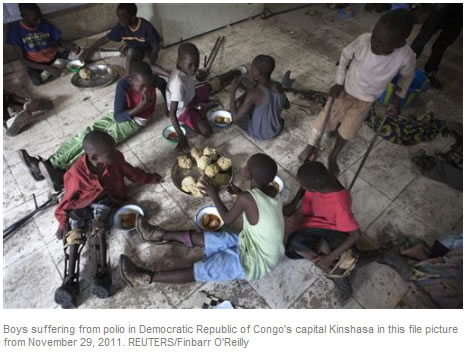 Ten years ago today, the continent of Europe was certified polio-free. This was a critical landmark and helped to accelerate efforts to stamp out the disease everywhere.
Ten years ago today, the continent of Europe was certified polio-free. This was a critical landmark and helped to accelerate efforts to stamp out the disease everywhere.
While an important day to commemorate and to honour those who dedicated their lives to this milestone, such as Dr George Oblanpenko, it is even more important to remember that the fight is not over.
Europe may be polio-free, and 99 percent of the world may be rid of the virus that attacks the nervous system and can cause irreversible paralysis within hours of infection, but we can’t stop until we eradicate the disease once and for all.
Levels of new polio cases this year are at an all-time low, but it remains a threat for children in Pakistan, Afghanistan, and Nigeria.
Last year, I had the opportunity to speak to the Rotary Club of London where I commended the amazing work the organization was doing on polio eradication.
An elderly gentleman came up to me afterwards and said that as a young boy, he contracted polio, though fortunately a more mild form of the illness. He went on to say two things that really stuck with me.
The first was that it would be a shameful act for rich countries to get rid of polio in their borders but allow the disease to continue in other, poorer countries even though we had the ability to eradicate it.
And second, he said that after getting so close to the goal of eradication, our credibility as a global community to tackle other big challenges would forever be compromised if we fail on polio.
Polio does not live within borders, and there is still a high risk for polio to be reintroduced elsewhere, including within Europe.
Just two years ago, the European region saw 478 cases of polio imported into Tajikistan.
A few weeks ago, more than 190 countries at the World Health Assembly declared the completion of polio eradication a programmatic emergency for global public health, recognizing the once-in-a-generation opportunity we have to ensure that all children, no matter where they live, are protected from this preventable disease.
A new report by an Independent Monitoring Board that assesses the global polio effort says that success is dependent upon new funding commitments.
Thankfully, countries in Europe such as Germany, Norway and Britain, have significantly contributed to the Global Polio Eradication Initiative through 2011.
But the global polio programme faces a shortfall of almost $1 billion and so we need these and other countries to increase their investments in the global polio effort, both through the current emergency period (2012-2013) and until the job is done.
It is not only the right humanitarian thing to do – but ridding the world of polio will also help free up resources to focus on other critical investments, like strengthening health systems.
I look forward to the day when we are celebrating the 10-year anniversary of the world being polio-free. I encourage you to watch this short video on the importance of finishing the job. We’re 99 percent there. We can’t stop now – we owe it to the world to end polio everywhere.



 View All Blog Posts
View All Blog Posts